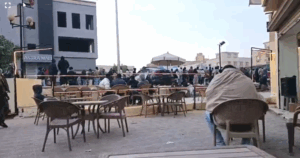‘Deepening repression in Sudan as world turns away’: HRW
Sudan’s human rights record deteriorated in 2014, with deepening political repression and a lack of accountability, Human Rights Watch (HRW) said today in its World Report 2015.
“Sudanese authorities should immediately end unlawful attacks on civilians, and hold those responsible to account. The authorities should release political detainees, and stop arresting and using excessive force against peaceful protesters,” HRW stated in its report of Sudan.
Sudan’s human rights record deteriorated in 2014, with deepening political repression and a lack of accountability, Human Rights Watch (HRW) said today in its World Report 2015.
“Sudanese authorities should immediately end unlawful attacks on civilians, and hold those responsible to account. The authorities should release political detainees, and stop arresting and using excessive force against peaceful protesters,” HRW stated in its report of Sudan.
“In the Darfur, Blue Nile, and South Kordofan states, Sudanese military forces are leaving a trail of abuse,” Daniel Bekele, HRW Africa director said. “In Khartoum and elsewhere, national security officials stifle dissent.”
On 31 October last year, large numbers of government forces entered Tabit in North Darfur, beating men, and raping women and girls over a two-day period. The Sudan authorities initially refused to allow Unamid access to the town. When the peacekeepers finally entered to investigate, HRW notes, security forces accompanied them during their visit, compromising the integrity of their investigation.
“In the Darfur, Blue Nile, and South Kordofan states, Sudanese military forces are leaving a trail of abuse. In Khartoum and elsewhere, national security officials stifle dissent.”
Between February and April 2014, Sudan’s Rapid Support Forces (RSF) attacked villages in South, Central, and North Darfur. The RSF is a government force consisting largely of former militias, recruited and led by Brig. Gen. Mohamed Hamdan Dagolo (“Hemeti”), a former Darfuri militia leader. The RSF troops torched homes and shops, looted livestock, killed and robbed civilians in dozens of villages, and forced tens of thousands of residents to flee to towns and camps for displaced people.
Sudanese government forces, including the RSF, also attacked villages in the Nuba Mountains region of South Kordofan, displacing tens of thousands of civilians in April, HRW reports. In May and June, government bombing damaged schools, mosques, churches, water sources, and health centres, including a Médecins sans Frontières clinic in the Nuba Mountains. Dozens of civilians were killed or injured.
In Blue Nile, civilians who fled government-controlled areas told HRW that government forces, again including the RSF, arbitrarily detained residents, raped women and girls, and restricted residents’ movements, farming, and access to food. Sudan indiscriminately bombs rebel-held areas in the state.
Government security forces used violence to disperse protests and arbitrarily arrested and detained protesters and activists. In September, security forces broke up memorial services for the anniversary of the killing of more than 170 protesters in 2013.
The National Intelligence and Security Service (NISS) and other security forces detained opposition party members and activists, despite promises by President Omar Al Bashir in 2014 to release all “political detainees”.
“Without any form of accountability, these patterns of abuse are becoming more entrenched by the year.”
The International Criminal Court (ICC) has charges pending against five people, including President Al Bashir, for war crimes, crimes against humanity, and genocide in connection with atrocities in Darfur. The Sudan government refuses to cooperate with the ICC, and has obstructed its work. HRW has repeatedly called on the UN Security Council to establish an international commission of inquiry into abuses in South Kordofan and Blue Nile.
“Civilians bear the brunt of Sudan’s brutal counter-insurgency tactics, and political repression across the country,” Bekele said. “Without any form of accountability, these patterns of abuse are becoming more entrenched by the year.”











 and then
and then